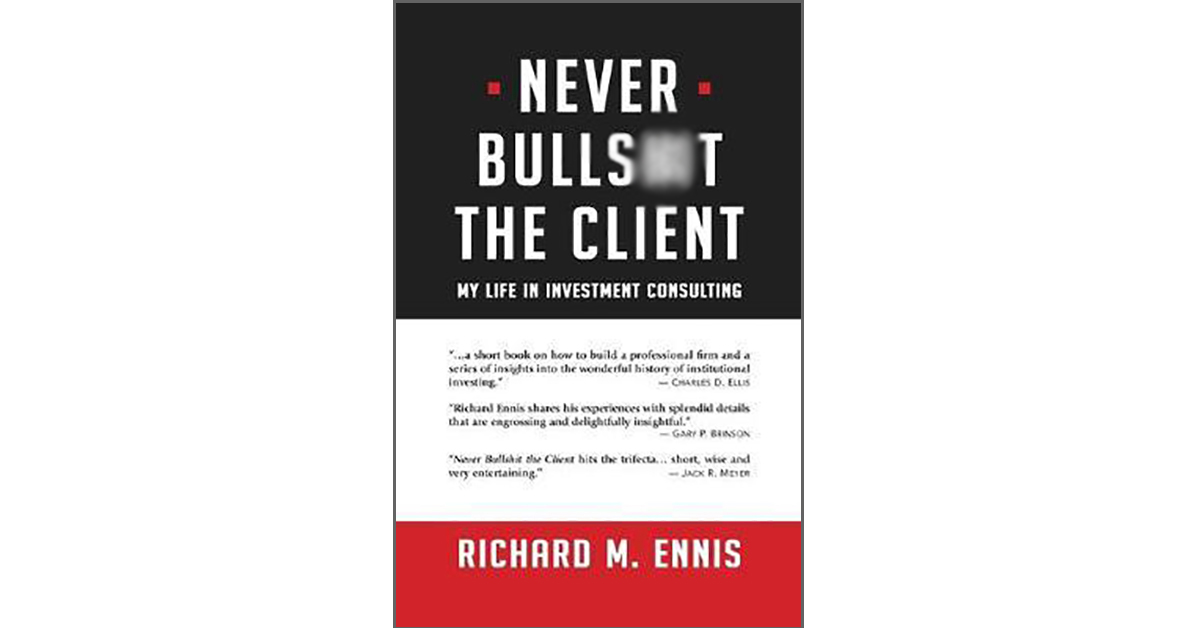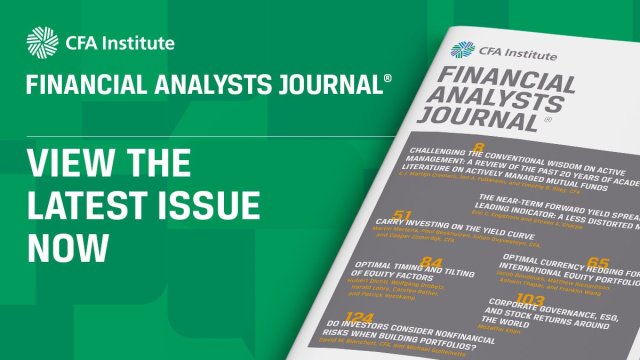[ad_1]
Never Bulls**t the Client: My Life in Investment Consulting. 2019. Richard M. Ennis, CFA. Carom Press.
When you pick up a book with this title, you might expect content that is brief, to the point, and unafraid to rattle the cage of conventional wisdom. That is exactly what you get with this memoir from Richard M. Ennis, CFA. Focusing on his personal and business experiences from childhood to retirement, the book takes readers through Ennis’s life and career from two perspectives.
One track is the personal story. It leads through the
author’s early years, focused on pool halls and fast cars, with little
indication of his professional future, to his arriving somewhat accidentally in
the security markets during the “go-go era” of the late 1960s. It is the story
of an entrepreneur who not only happened to be in the right place at the right
time (A. G. Becker’s storied Funds Evaluation Division, known as the birthplace
of today’s investment consulting industry) but was also prepared to risk
starting a new firm (Ennis, Knupp & Gold) in what was effectively a new
industry.
The parallel track takes readers through that new industry’s
evolution, from the scrappy start of the independent consultants trying to
figure out whether they had a workable business model through to today’s
influential consulting business, dominated by a relatively small number of
megafirms.
Students of the investment industry should be aware that this is neither a textbook nor a historical chronicle. Richard Ennis’s story is just that — a story — or rather, a series of stories. The consulting business is (mostly) about people, and that is what we get. As might be expected, some of Ennis’s colleagues and acquaintances will be well known to readers. In addition to his original partners, Jim Knupp and Ron Gold, we learn about Ennis’s involvement with Harry Markowitz, Jim O’ Brien, Dennis Tito, and many other noted investors. But we also hear about his pool hall pals, including Bunt, Gator, and Becky the bartender!
Significantly, about one-third of the book’s content is contained in its two appendices. They consist of a selection of Ennis’s articles on a wide range of subjects, including investment policy. (He was executive editor of the Financial Analysts Journal from 2006 to 2010.) The articles provide insight not only into several important topics but also into Ennis’s approach to the investment industry.
For investment professionals, my main suggestion is to read this book backward. Not literally, of course, but for those looking specifically for investment insight, the appendix is the place to start. The innocuously named “Appendix 1” runs just 16 pages but is the “essence of Ennis” — a clear exposition of the author’s thinking on investment policy for institutional funds.
The articles in “Appendix 2” are also well worth reading.
Even though these date from before Ennis’s retirement on the sale of his firm
in 2010, the messages are still relevant today. In fact, it is interesting to
note how relevant some of these articles remain, a decade or more after they
were written. “Darwin and Investment Product Proliferation,” for example,
raises concerns over the sheer number of new products driven by business needs
rather than investment innovation. That article dates back to 1997! “The
Uncorrelated Return Myth” is a lively 2009 refutation of the existence of
uncorrelated, high-risk-premium assets, while “Pensions or Penury?” foreshadows
a crisis that has continued to unfold since the article was first published in
2007.
With that reading under your belt, only then go back to chapter 1 and start on the engaging story of Richard Ennis’s life and career. As a “book of stories,” it is well written, with a light touch that balances personal anecdotes, encounters with investment luminaries, and the basics of investment consulting. In his preface, Ennis notes that his goal is to “help people in the fields of investment management and consulting gain a better appreciation of our shared history.” From this reviewer’s perspective, he has achieved that.
If you liked this post, don’t forget to subscribe to the Enterprising Investor.
All posts are the opinion of the author. As such, they should not be construed as investment advice, nor do the opinions expressed necessarily reflect the views of CFA Institute or the author’s employer.
Professional Learning for CFA Institute Members
CFA Institute members are empowered to self-determine and self-report professional learning (PL) credits earned, including content on Enterprising Investor. Members can record credits easily using their online PL tracker.
[ad_2]
Image and article originally from blogs.cfainstitute.org. Read the original article here.


